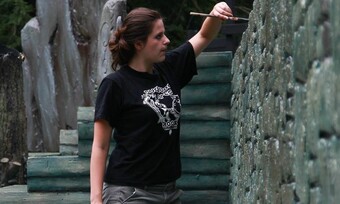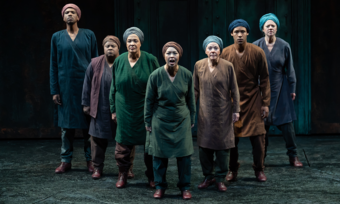The College Internship Crisis, or How It Worked for Me
Before my sophomore year in college even began, I was already aware of my destiny for the summer after: an internship. There was no way to wheedle out of the prospect; it seemed as if every theater student at my school had either just come back from a summer internship or was already researching for their next one. There was not a seed of doubt in my mind that my sophomore summer would be spent working with a big-time theater company in New York City where I would be sitting in on rehearsals, learning the ins and outs of a professional theater company, networking like I never have before, and be so beloved that I would be remembered and highly considered for a job once I graduate. Well… perhaps the latter wasn’t in my original mindset, but it seemed to be for many of my friends. This was our chance to step out of academia and begin our careers!
Unfortunately for me, a semester studying abroad took my mind off of my seemingly mandatory summer internship until I realized that many of the big-time companies had already closed their doors to further applications. I was late in the game and had to make some quick moves if I were to spend my summer in the city. As friends received acceptance letters, I was still glued to my computer, waiting for an email, a notification that they had seen my résumé, anything. By the middle of May, I was terrified that my summer would be spent back at home working concert security and babysitting, as my friends were already moving into the city and beginning their internships. Those who know me, however, have witnessed my stubborn drive, and with one week left in May, I applied to ten very small internships I had little to no knowledge of. It wouldn’t be my dream summer, but at least I would be in New York and not at home.
What came to pass was the biggest lesson I’ve learned so far as a young adult. I had finally found an internship with Concrete Temple Theatre, a small company based in the city that uses visual arts, dance, puppetry, and music to create a repertoire of new theater works that tour the city as well as internationally. Not only do they tour, they also provide pre- and post-performance workshops in order to bring myth and ritual back to the center of dialogue. As a studying actor and director with a deep interest in multidisciplinary theater, I knew that this company would be the perfect fit. I had approximately six days to move into New York before I began working as an assistant to Artistic Directors Renee Philippi and Carlo Adinolfi, as well as Company Relations head Amy Rose Marsh. My life had been put into overdrive, and I dove head first into the world of subletting and housing arrangements. Long hours of searching and luck found me in a very affordable apartment in Harlem, and just one week after thinking my summer was ruined, I was working for a theater company and living by myself for the first time.
As studying young adults, we should not be looking at ways to squeeze into the business years before we are actually in it. We should use this time, the time when we aren’t expected to be working professionals just yet, to our advantage and learn whatever fits our individual needs.
I still remember my first conversation on the phone with Amy who, after welcoming me to the team, asked me, “What do you want to learn this summer?” It was the first time in my entire search for an internship that someone was asking me what I wanted to learn. I told her that I wanted to know the ins and outs of a professional theater company, and in my two months with Concrete Temple Theatre, that’s exactly what I did. My eyes were completely opened to the reality that is running a small theater company: the copious research for grants, rehearsal spaces, and venues, as well as the constant self-motivation required to reach your shows to new audiences through social media, blogs, and other websites. I was astounded at the amount of trust Renee and Carlo put on me to conduct a lot of major research, and as they were juggling plans to tour one show in New York while bringing another to Mexico City later in the year, I was figuring out the logistics of yet another endeavor, as well as doing my own research on future grants. I felt like an integral member of the company, and by the end of my summer, the fruits of my labor were very tangible.
To say that my entire internship experience this summer happened with Concrete Temple Theatre, however, is severely misleading. What I quickly came to learn is that my summer internship had many layers. It wasn’t just on-the-job training for a theatre company; it was on-the-job training for life after college. With an unlimited Metro card as payment for my part-time research for Renee, I needed to take on a job to pay for groceries, what I owed my father for fronting me two months of rent, and for new shows in New York I wanted to see on the side, if I could even afford them. In a similar scramble to the one I pulled off in late May, I handed out close to forty of my work résumés before luck grabbed hold of me and gave me a server job at Red Rooster, the restaurant of celebrity chef Marcus Samuelsson. To say finding that job was easy would be a crippling understatement. I almost worked harder to keep up with Red Rooster than I did with Concrete Temple Theatre, which I guess is a nod to the realities I will face in the future if I wish to create my own company while making enough money to live in New York City.
I soon came to realize that my original dreams were skewed. Hearing stories from friends about their big-time unpaid internships slowly turned from enthusiastic to jaded: hours were long, finding a job to offset living expenses was hard, job tasks were less creatively focused. I had even stumbled upon fellow HowlRound contributor Annah Feinberg’s article “Confessions of a Serial Intern,” in which she writes of her inability to be hired by any of the seven companies she interned for and the inherent problems of unpaid internships that are less about education and more about free labor. I was suddenly surrounded by a sense of animosity toward the internships that I thought were all part of the modern college plan. And yet, I was not sharing any of these feelings.
As I look back, I realize that I did not achieve the dream internship I had set out to find. I was not working at one of New York’s largest nonprofit theater companies. What I have realized, however, is that my dream was conceived when I was uneducated in what an internship should really be. As we all know, the ratio of graduating students with a degree in the arts to actual jobs in the arts is wildly unbalanced. As Annah Feinberg discovered, companies find many interns and, at the end of the day, will not have the capacity (or funding) to take all of them on as hired staff upon graduation. I can’t rightfully say what this means for me when I graduate in two years, but then again, I don’t believe that has anything to do with my summer internship experience. As studying young adults, we should not be looking at ways to squeeze into the business years before we are actually in it. We should use this time, the time when we aren’t expected to be working professionals just yet, to our advantage and learn whatever fits our individual needs. I have found myself fortunate to learn this lesson by chance. Moving forward in my academic career, I will continue to make decisions in this light. Where will I learn the most? What do I need to know before I’m living on my own without a curriculum or meal plan to hold me up? If there aren’t jobs in the preexisting theater world when I enter it, do I have the tools to potentially create my own?
I cannot learn these lessons by getting coffee for employees, filing paperwork, or running errands. Luckily, I never had to do any of those things this summer; my unintentional less-is-more approach ensured that. I wasn’t attempting to thrust myself into an established framework; I was creating one with a loving company that is on the rise. I have even agreed to continue my contribution to Concrete Temple Theatre when I am back in college this fall, and my managers at Red Rooster have been more than willing to let me come back and work for them when I’m in the city next.
For now, I return to a year’s worth of guaranteed educational programming. The cycle is repeating, and everyone my age is looking to line up his or her big-time internship for next summer. I have yet to think about what I’ll be doing come next May, but I will definitely be precise with where I choose to extend my education, in hopes of another dream summer.











Comments
The article is just the start of the conversation—we want to know what you think about this subject, too! HowlRound is a space for knowledge-sharing, and we welcome spirited, thoughtful, and on-topic dialogue. Find our full comments policy here
This was truly inspirational!!! I can't wait to hear what amazing things you do in the near future!!!
One of my jobs as a theater intern is to read HowlRound articles. Little did they know they were giving dangerous ammunition such as this. Loved reading it. Thanks.
Sounds like you ended up with the best internship deal, especially after only two years of college behind you. I do confess to being bothered by the fact that your theatre program seems not to have offered advice or support in your internship search. Did they?
As someone who spent a number of years leading a university theatre training program, I've always felt these operations and their faculty owe their students significant assistance with internship placement -- among many other oversight issues, making sure that carrying coffee is keep to a minimum, unless the intern is carrying it to the director and then sitting at their elbow during rehearsals. Theatre training programs that are seriously student-centered, should be establishing internships with a range of theatres and related organizations working in a range of styles and offering experiences that actually offer an educational benefit: that means setting up internships where the planned supervisors of the interns will actually look forward to partly functioning as professional teachers with the interns assigned to them. Simply telling students they ought to find an internship is not healthy for theatre departments, their students, or in the long term our profession.
Like I said in the article, I didn't even begin to think about a summer internship until a month after returning from studying abroad, so by the time I reached out for advice most of the internships I were interested in had already expired deadlines. I did, however, seek out my wonderful advisor and had a great conversation with her. She gave me some options and places to look into, but unfortunately they either had expired deadlines as well or they simply never returned my emails. Again, most of my failures at the beginning of my search were due to the fact that I was only considering big named theatre companies and programs; if there were smaller companies my advisor suggested, I immediately rejected them.
Another thing to note is that since having this summer experience, I believe that the education I receive at an internship needs to be separated from the education I receive at college. Of course, both are trying to reach the same goal, but I think that spending time away from my college really gave me another perspective on the business that I wouldn't have received if I was being watched by a "planned supervisor." I think the best my college can do is present me with options, but from there on out, I, as a young adult, need to step up to the plate and work independently.
I love this post James, and yes, New Victory has an AWESOME paid apprenticeship. At Playwrights Foundation we rely on the smarts, self reliance and young audacity of our volunteer assistants (otherwise known as 'interns') and here we focus on important jobs that help the volunteer assistants and PF in our work, from most important to most mundane, and, many an intern has transitioned into a paid job, at least for a while. We are really proud of the many young artists that have started here and then landed great jobs in the area!
I encourage you and your friends to look into a paid apprenticeship (not internship) at The New Victory Theater for next summer. It's an excellent opportunity to work side by side with theater professionals and learn how a nonprofit arts organization works. Best of all, you make viable contributions work-wise, your opinions and ideas are valued and shared with others in the organization, and you receive mentorship.
Great post. I intern at a mid-size New York theater company and don't see the love you got at Concrete Temple. A lot more getting coffee! Sounds like your experience was valuable though. A note to Artistic Directors: treat your interns well! They'll write nice blog posts on Howlround about your theater and won't complain to everyone about how poorly you treat your unpaid labor.
Thanks for the post, James. Your story is one that is not usually heard, but seems to concur with the general sentiment that there is a lot to be said for having more stake in a "smaller" company, than having little stake in a "reputable" company.